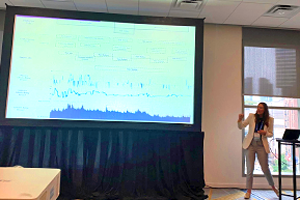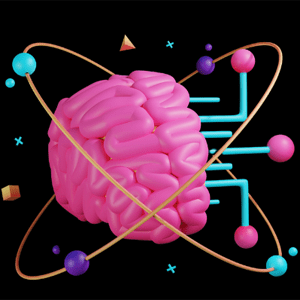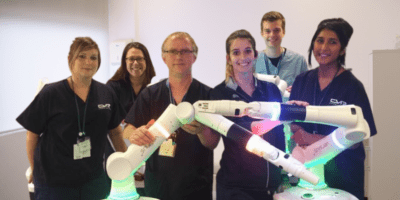Dr Nicola Thomas is a lecturer in work psychology at the University of Sheffield Management School and her research interests include how emotions impact people at work. Nicola is interested in how AI is being used to monitor and track emotions at work, as well as how work is changing. She is a regular BBC contributor, appearing on Newsnight, Woman’s Hour and BBC Radio Four.

“There are many ethical considerations for using AI in the workplace, none the least of these are data protection, copyright, and intellectual property, but the ethical issues I am most focused on are companies using AI to monitor and track emotions.”
Evolving plans: From law to organisational psychology
As soon as I left high school (in New Zealand where I am from), I started law school. You needed to maintain high grades to make it into the second year, and after failing my first-ever exam I knew I needed to take some time out to refocus on a degree I felt more passionate about. This led me to study a topic called organisational behaviour, which seeks to understand how people behave at work.
After graduating I worked in human resources for a few years, before undertaking a master’s in organisational psychology at the University of Leeds, then a PhD in organisational psychology at the Technical University of Denmark, looking at using AI to understand emotions at work. Now, I work as a lecturer in work psychology at the University of Sheffield.
Academia day-to-day

In my role as a lecturer in work psychology, I spend a lot of time researching, so conceptualising and conducting new research, reading, writing, and publishing my work. I also work with students who are researching as part of their degrees, supervising and guiding them in their research projects.
A big part of my day-to-day job is teaching. I teach students in the Management School and in the School of Psychology about topics related to organisational psychology. I love engaging with the students and helping them understand important concepts that are impacting the future of work.
Harnessing AI as a research tool to engage and enable
I am passionate about using artificial intelligence in novel ways to understand phenomena that we have previously lacked data on. One main application of AI in my research is using computer vision and smartwatches that employ AI algorithms to monitor and track changes in physiological processes like stress, heart rate and skin sweat, as well as AI facial expression analysis to research topics like stress, mental health and burn out at work.
Using these tools, we can compute considerably more data than we have been able to before, with these sophisticated algorithms reminding workers to breathe when they are stressed, or tracking and predicting depression before it has reached crisis point.
Some of the main findings in my research have been understanding the emotional processes at play within conflict. By using AI to monitor emotions and physical stress, we have been able to understand how taxing conflict at work is for employees, highlighting new ways to train staff to avoid the most taxing types of conflict. This research collects incredible amounts of data, and without AI processing this data would take years instead of weeks.
AI revolution

AI as a term encompasses so many different things. This ranges from the AI algorithm we use every day in Google searches, to generative AI like chatGPT. Generative AI, deep-learning models that can generate text, images and content, are taking the world by storm at the moment.
All of these types of AI have broad implications for workers. On the one hand, as we integrate more AI tools into most knowledge sector roles, our work tasks will become more automated. This will free up time for more human skills like relating to people, as well as creative idea generation and critical thinking tasks.
On the other hand, as we reach new levels of productivity due to AI, we face an opportunity to organise our working lives in new ways. This would ideally look like moving to a four-day-working-week and introducing new economic policies like a Universal Basic Income.
The need for ethical implementation
There are many ethical considerations for using AI in the workplace, none the least of these are data protection, copyright, and intellectual property, but the ethical issues I am most focused on are companies using AI to monitor and track emotions. While this can potentially support some employees to understand how to utilise new tools when they are stressed, when this technology is misused workers feel monitored and perceive distrust.
Canon China recently enforced AI smile cameras at work. Workers had to smile to enter the workplace, to book a meeting room, and to unlock their computers. The ethical issues for this emotional monitoring are not only obvious, but the use of this technology itself in this way is flawed.
On the positive side, I love AI that makes ‘grunt work’, that is work that is boring and mind-numbing, easier. For me, that looks like an AI assistant who helps with calendar management and transcribes meeting notes. While not groundbreaking, the impact of reducing our cognitive load through assistive AI in this way frees us up to spend more time doing work we enjoy, which has endless benefits!
Connect

Coming up next
I am currently working on a book exploring these themes in more detail. I am looking forward to dedicating more time to researching the latest AI trends and work, and future gazing about what is happening and where we are going in the world of work.




